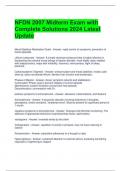NFDN 2007 Midterm Exam with
Complete Solutions 2024 Latest
Update
Mood Stabilizer Medication Goals - Answer- rapid control of symptoms, prevention of
future episodes
Lithium carbonate - Answer- A simple chemical compound that is highly effective in
dampening the extreme mood swings of bipolar disorder. most widely used, needed
with antipsychotics, helps with irritability, insomnia, nervousness, flight of ideas,
paranoia.
Carbamazepine (Tegretol) - Answer- anticonvulsant and mood stabilizer, mostly used
when pt. does not tolerate lithium. Monitor liver function and drowsiness.
Phases of Bipolar - Answer- Acute: symptom reductio and stabilization
Continuation Phase: goal is prevent relapse of current episode
Maintenance: sustain remission and prevent new episode
Discontinuation: conversation with Dr.
positive symptoms of schizophrenia - Answer- delusions, hallucinations, and illusions
Schizophrenia - Answer- A psychotic disorder involving distortions in thoughts,
perceptions, and/or emotions. "shattered mind". Must be present for significant period of
1 month
negative symptoms of schizophrenia - Answer- Changes that diminish functioning. The
absence of appropriate behaviors (expressionless faces, rigid bodies)
neologisms - Answer- invented words by the client
Verbigeration - Answer- repetition of words or phrases, may not have meaning to
listener
Perseveration - Answer- persistent adherence to a thought or idea
Hypervigilance - Answer- sustained attention to external stimuli, expecting something
important or frightening to happen
, waxy flexibility - Answer- posture held in odd or unusual fixed position, for extended
period of time
Etiology of Schizophrenia - Answer- Heredity, high dopamine levels, high exposure to
stress
Schizophrenia is NOT caused by - Answer- medication taken during pregnancy, poor
bonding during infancy, poor parenting, guilt, failure or misbehaviour
Typical Antipsychotics - Answer- Haldol: significant neurologic side effects, negative
symptoms don't respond well - may even worsen
Atypical Antipsychotics - Answer- riperdal or seroquel: newer antipsychotic, less
significant neurologic side, more effective at improving negative symptoms
Neuroleptic Malignant Syndrome - Answer- Adverse reaction to antipsychotics with
severe "lead pipe" rigidty, FEVER, and mental status changes
Acute Illness Period of Schizophrenia - Answer- bizarre or disruptive through and
behaviour (cannot be over looked) + and - symptoms included
TX = psychotherapeutics, suicide prevention, normalize sleep and reduce substance
abuse
Stabilization period of schizophrenia - Answer- sypmtoms less acute, but may be
present, med. regime is established, family and patient adjust, treatment is intense
Maintenance & Recovery Period of Schizophrenia - Answer- condition is stabilized,
improvement in symptom remission. Focus - regain previous level of functioning and
quality of life, identify signs of a relapse and how to cope, medication compliance and
family support are crucial. Education is key!
Relapses in schizophrenia - Answer- occur any time during TX and recovery, major
reason is noncompliance with medication regime
schizoaffective disorder - Answer- Psychotic disorder featuring symptoms of both
schizophrenia and major mood disorder.
Epidemiologic and Risk factors of Schizoaffective disorder - Answer- lifetime prevalence
is estimated to be around 0.3%, onset is early adulthood and the most type is presented
is bipolar, later onset are likely to be the depressive type, comorbidity is substance
abuse
Priority care issues of schizoaffective disorder - Answer- suicide risk, persistant
psychotic disorder with a mood component, comorbidity with substance abuse may
increase risk of suicide




